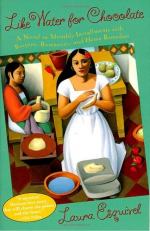|
This section contains 6,359 words (approx. 22 pages at 300 words per page) |

|
SOURCE: “Spanish American Women Writers: Simmering Identity Over a Low Fire,” in Studies in the Novel, Vol. 20, No. 1, Winter, 1996, pp. 147–65.
In the following essay, Bilbija compares and contrasts Esquivel's Like Water for Chocolate and Silvia Plager's Like Potatoes for Varenike.
“… for example, food is to be eaten; but it also serves to signify (conditions, circumstances, tastes); food is therefore a signifying system, and must one day be described as such.”
—Roland Barthes, Critical Essays
“Introducing The CanLit Foodbook”
“One man’s cookbook is another woman’s soft porn.” —Margaret Atwood
When Virginia Woolf argues in A Room of One’s Own for an appropriate and pertinent place for a woman, she never mentions the kitchen as a possible space in which her intellectual liberation from the patriarchal system could be enacted.1 At first glance, this area had always been assigned to a wife, servant, daughter, slave, mother, grandmother...
|
This section contains 6,359 words (approx. 22 pages at 300 words per page) |

|


